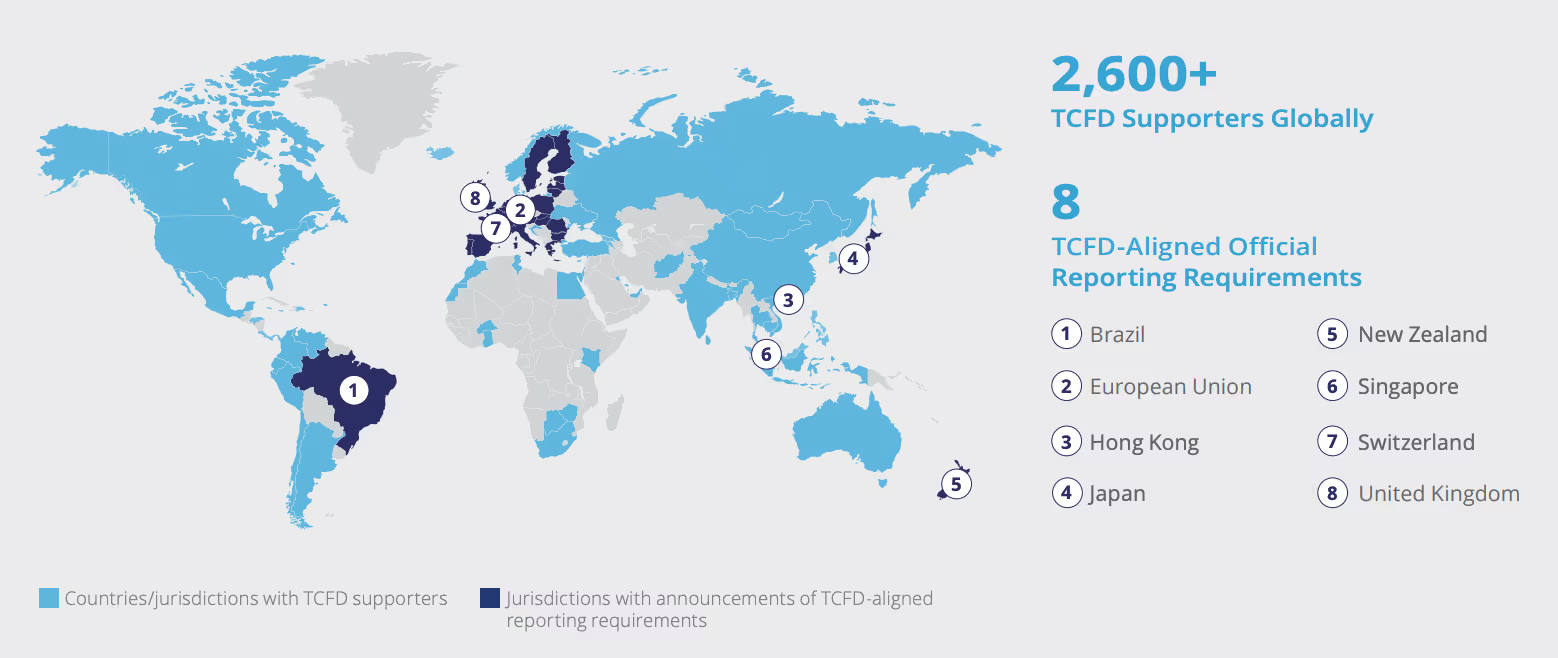
The TCFD has been officially disbanded and will be replaced with the Sustainability Disclosure Standards (SDS) in July 2024, with some changes to GHG reporting. These standards will follow guidelines set by the International Financial Reporting Standards (IFRS) Foundation and the International Sustainability Standards Board (ISSB).
The SDS will offer a newer, more detailed framework for international ESG reporting, risk management and climate-related financial disclosures.
The IFRS is set to take over monitoring the progress of companies’ climate-related disclosures in 2024. The IFRS initiative will closely resemble the TCFD task force recommendations and standards with some changes and influence from the ISSB that calls for more detail and transparency on risk disclosures for different climate-related scenarios.
The Task Force on Climate-Related Financial Disclosures (TCFD) was created in 2015 by the international Financial Stability Board (FSB) to develop consistent climate-related financial risk disclosures for use by companies, banks, and investors. The aim is to provide financial stability globally, as climate change will negatively impact our economy.
The main objective of TCFD reporting is to disclose the climate-related risks and opportunities of a company as well as the financial impact those might have on the company's operations and business model.
The TCFD reporting frameworks provide consistent and transparent information to all financial actors and global markets. Firms' climate-related disclosures are made more consistent and comparable under this initiative. Also, the TCFD believes that better information will allow companies to incorporate climate-related risks and opportunities into their risk management, strategic planning and decision-making processes. It also enables better ESG management and induced performance.
The TCFD is not a corporate reporting standard but a way of understanding how firms approach the financial risks and opportunities related to climate change.

The TCFD is still mainly a voluntary framework for companies of all sizes, industries and jurisdictions. However, more countries are considering making TCFD-aligned climate-risk reporting mandatory. Companies need to start aligning with the TCFD to stay ahead of the competition, develop a future-proof roadmap for their operations to comply with current and future climate policies and access advanced financial resources such as corporate green bonds.
From 6 April 2022, over 1,300 of the largest UK-registered companies and financial institutions must disclose climate-related financial information on a mandatory basis.
As of April 2022, UK companies with the following criteria are obliged to TCFD-aligned reporting:
1. All UK companies that are currently required to produce a non-financial information statement:
2. UK registered companies with securities admitted to AIM with more than 500 employees.
3. The UK registered companies which are not included in the categories above have more than 500 employees and a turnover of more than £500m
4. LLPs which have more than 500 employees and a turnover of more than £500m
.avif)
A TCFD-aligned report should contain all relevant information on a company's climate-related risks and opportunities as well as the resulting financial impacts of those.
The TCFD requires companies and LLPs to disclose climate-related financial information in line with the four overarching pillars of the regulation's recommendations on a mandatory basis (Governance, Strategy, Risk Management, Metrics & Targets). Now, let's explain how these recommendations are defined:
These necessary disclosures help investors and others understand how reporting organisations consider and assess climate-related risks and opportunities and their economic impacts.
Find more information on the TCFD Guidance on Metrics, Targets and Transition Plans, and TCFD Recommendations of the Task Force on Climate-related Financial Disclosures.
The TCFD defined seven principles for adequate disclosures:
Regulations are to be made by the end of 2021, with rules coming into force on the Common Commencement Date of 6 April 2022 and applicable for accounting periods starting or after that date.
Thus, most companies with a calendar financial year will need to include the mandatory climate-related financial disclosures for the first time in their annual report and account for the financial year commencing on 1 January and ending on 31 December 2023.
Keep up with climate risk disclosure by reporting on the TCFD. For your compliance needs, Plan A has the perfect solution. Request a demo with our policy experts.